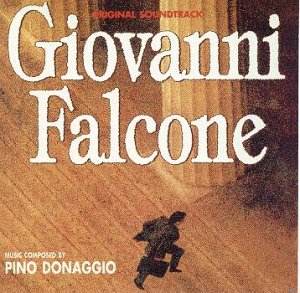Pino DONAGIO Giovanni
Falcone  OST
OST  PACIFIC
TIME PTE-8524-2 [41:01]
PACIFIC
TIME PTE-8524-2 [41:01]

Based on a true story, this 1994 political thriller is an
Italian production with a score by one of that country's leading composers,
Pino Donaggio. After establishing himself internationally with such fine
scores as Don't Look Now and Carrie in the 70s, Donaggio tends
these days to work mainly on home-grown projects like this, although he is
reportedly due to reunite with Brian De Palma later this year on a Howard
Hughes biopic.
The main title begins with a quick snatch of choral chant leading
into a fairly basic but nonetheless enjoyable ascending theme. Unfortunately
this doesn't really go anywhere and is over far sooner than I would have
liked. Rumbling chords with an almost Arabian flute sound follow and after
much atmospherics, we are introduced to a short-lived violin melodic section,
very much in the typical Donaggio mould. All of these elements are heard
again briefly at various stages during the score, although none are really
given the opportunity to develop and make much of an impression.
`The Big Dragnet' follows, featuring lots of thumping piano
and squealing strings. This track has a typically Italian style that I am
rather fond of and in places has similarities with some of Keith Emerson's
work on the extraordinary Inferno. From here on though the majority
of the cues are devoted purely to background ambience with `Attempt' one
of the more interesting pieces, primarily because it has an overall style
that brings back memories of some of Donaggio's outstanding early work such
as The Howling.
When a true melody is finally heard in `No Freedom' utilising
Donaggio's characteristic strings and piano, it makes a very welcome respite
from the suspense music that dominates the rest of the score. This is quite
an engaging piece, but with subsequent cues like `Operation in Progress',
`Investigation' and `Politics and the Mafia' to name only a few of the twenty
two tracks featured, the emphasis is very much on creating a sense of uneasy
tension. And despite the fact that this is undoubtedly effective film music,
it's not particularly rewarding to listen to. Admiration for work such as
this depends entirely on whether you believe that music should be enjoyable
as a listening experience or simply needs to make an impact in tandem with
the images on screen. I've touched upon this subject before and will no doubt
do so again in the future, as it seems to me that it lies at the very heart
of film music appreciation.
In conclusion, this is a proficient film score, but it's unlikely
you will be taking time out to listen to it again after the first couple
of plays. And though this composer has many admirers (myself included) I
doubt this will rank very highly among them. It just does not have either
the melodic qualities or the inventiveness of his best work to generate any
real enthusiasm.
Perhaps I am simply being nostalgic longing for the return
of the Donaggio of the 70s and early 80s, but whether it's a deliberate change
of attitude, a failure to be inspired by the material or imposed restrictions
put upon him by film-makers, on this showing he is just not the composer
he used to be.
Reviewer
Mark Hockley
